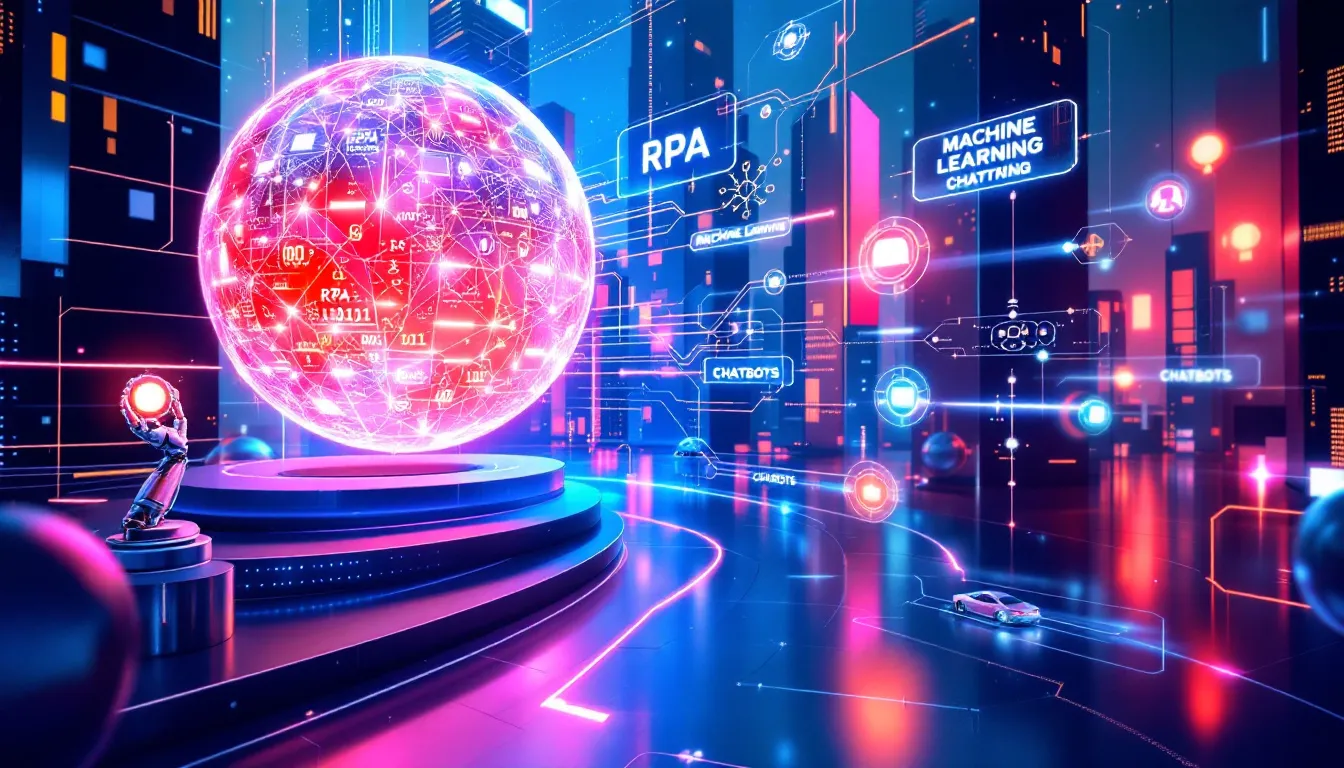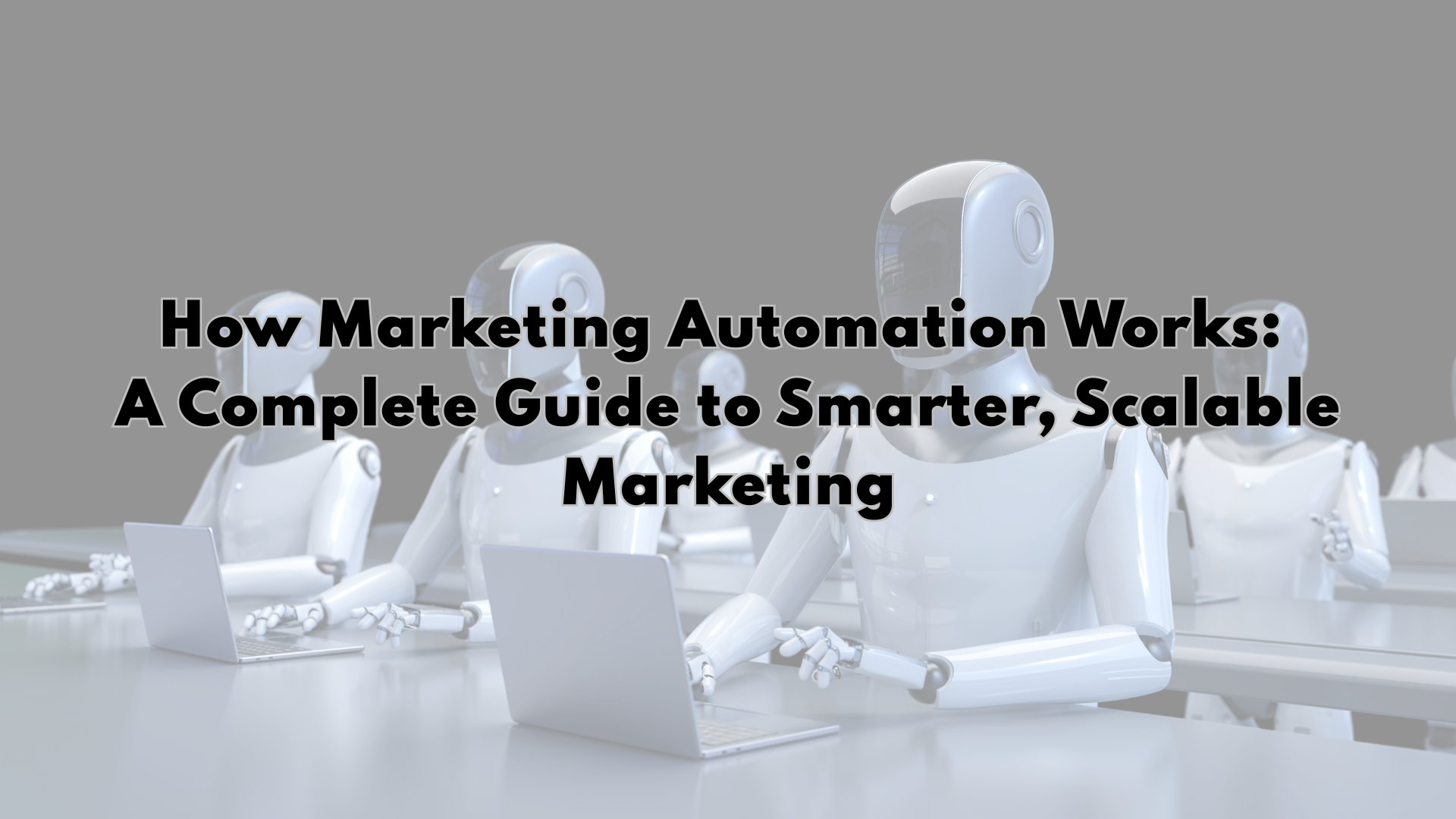CFO GROUP INTEGRATED SERVICES
The Best AI Automation Tools That Save Time, Slash Costs & Skyrocket Efficiency
CMO Media Lab Pte Ltd • April 8, 2025
Let’s face it — traditional marketing methods just don’t cut it anymore. Mass emails? Banner ads? Generic messaging? Consumers have evolved, and they expect more. That’s why AI marketing is now the secret weapon for businesses in Malaysia looking to grow smarter, faster, and more profitably.
What Is AI Automation Really and Why Are Smart Companies Using It?
AI automation, or intelligent automation, combines artificial intelligence's cognitive capabilities with robotic process automation (RPA) task performance to enhance business operations. Unlike traditional automation, which relies on predefined rules and scripts, AI-driven automation systems analyze data, learn from patterns, and make intelligent decisions with minimal human intervention. This powerful combination enables businesses to automate repetitive tasks, streamline processes, and adapt to changing conditions more effectively.
Integrating AI and other automation technologies into process automation reshapes industries by boosting efficiency and addressing various operational challenges, including complex processes. Cognitive automation, which involves collaboration between AI and automation, enhances capabilities and adaptability, allowing businesses to grow and thrive in a dynamic environment.
AI automation is more complex than a technological advancement. It handles repetitive and routine tasks, reduces costs, and accelerates digital transformation, enabling businesses to focus on more strategic tasks. It’s a strategic necessity for modern businesses.
How Does AI Automation Work Behind the Scenes?
At the heart of AI automation lies a synergy of advanced technologies such as machine learning, natural language processing, and computer vision. These technologies enable AI systems to analyze vast amounts of unstructured data, make intelligent decisions, and automate processes with remarkable accuracy.
Natural language processing (NLP) enables AI tools to interpret and respond to customer queries, while machine learning algorithms continuously enhance the system’s performance by learning from historical data, human language, and human intelligence.
A key aspect of intelligent automation is merging AI, machine learning, and robotic process automation to create a streamlined automated environment. This integration significantly reduces task completion times, allowing businesses to focus on more strategic operations.
Moreover, AI-powered business process automation can drastically improve data accuracy and minimize errors in business processes, providing a competitive edge over traditional automation methods.
Why AI Automation Is the Smartest Investment Right Now
The benefits of AI automation extend far beyond simple task automation. Here are some of the most significant advantages:
- Boost in efficiency, as AI systems can learn, adapt, and make data-driven decisions.
- Optimized workflows, leading to reduced manual errors.
- Faster data processing.
- Significant cost savings by minimizing human errors.
- Enhanced productivity across various industries.
AI-driven automation tools also empower businesses to make more informed decisions quickly, improving strategic planning and operational efficiency. By analyzing vast data sets accurately, AI systems analyze data and provide valuable insights that help businesses stay ahead of the competition.
The consistency and accuracy offered by AI automation and generative AI optimize resource allocation and reduce costs, making it a beautiful solution for sectors like healthcare and manufacturing. Additionally, leveraging AI models can further enhance these capabilities
The productivity enhancements by AI automation are remarkable, with potential increases of 15% to 40% across different sectors. AI-powered productivity tools automate routine, low-value tasks, allowing employees to focus on more strategic and high-value activities. This not only boosts overall productivity but also helps to boost efficiency, enhancing employee satisfaction and engagement.
How CMO Media Lab Helps You Launch AI Automation Without the Overwhelm
Many companies struggle to choose or implement the right automation tools without a clear strategy, resulting in wasted time and poor ROI. That’s where CMO Media Lab comes in.
We help growth-focused businesses simplify and fast-track their AI automation journey. From selecting the best-fit tools to integrating systems and optimizing workflows, our team ensures you're set up for success. Whether you're just getting started or scaling fast, our AI-backed marketing and automation solutions take the guesswork out of growth.
We Don’t Just Recommend Tools—We Build Profit Machines.
Types of AI Automation Tools: Which One Is Right for You?
AI tools come in many forms—each serving a different need. The most common categories include:
- Robotic Process Automation (RPA) – Automates rule-based tasks
- Intelligent Automation – Combines AI + RPA for smarter workflows
- CX Automation – Chatbots and virtual assistants for customer support
- AI-Powered Productivity Tools – Helps teams stay focused and organized
Leading names include UiPath, Automation Anywhere, Fireflies, Leena AI, Moveworks, and Kissflow. Each brings something unique to the table—whether it’s natural language understanding, auto-generated meeting summaries, or AI-driven HR support.
Platforms like Clockwise and Asana boost productivity by organizing team calendars and simplifying project management, while tools like Creatio and Nintex enable companies to build smart workflows with AI recommendations.
Leading AI Automation Tools for Businesses
Several AI automation tools stand out for their ability to streamline business processes and enhance efficiency. Leena AI, for instance, automates HR processes, improving employee engagement and reducing administrative workload. Fireflies is another notable tool that automatically records and summarizes meetings, helping teams document discussions and effectively follow up on action items.
Moveworks provides an AI-powered assistant that streamlines employee support by resolving HR issues and offering instant answers and insights for actionable next steps. Similarly, Kissflow offers AI-driven solutions for business process, case, and project management, enabling workflow automation and enhancing operational efficiency. These tools exemplify how AI can be leveraged to optimize various aspects of business operations.
Other noteworthy tools include Clockwise, which optimizes employee calendars to ensure uninterrupted work and productivity, and Asana, a work management platform that helps teams organize tasks and improve efficiency. With platforms like Nintex and Creatio offering AI-assisted workflow design, predictive analytics, and intelligent recommendations to streamline workflows, businesses are well-equipped to navigate the complexities of modern operations.
Business Process Management on Steroids—Thanks to AI
AI-powered tools significantly enhance business process management by continuously monitoring and improving supply chains, predicting potential issues, and suggesting workflow improvements. These tools analyze large data sets to identify patterns, enabling businesses to make data-driven decisions and optimize automated processes.
By automating complex tasks and reducing the need for human intervention, business process automation allows companies to focus more on strategic tasks, driving overall business success while adhering to essential business rules.
Integrating AI into business processes also facilitates cost reductions and increased productivity. For example, AI can streamline onboarding processes by simplifying tool provisioning for new employees, ensuring a smooth and efficient transition. Additionally, AI analytics can optimize supply chain management, reducing waste and improving production timelines in the manufacturing industry.
OpusClip is an AI tool that repurposes long-form videos (like webinars or podcasts) into short, attention-grabbing clips for TikTok, Instagram Reels, and YouTube Shorts. It automatically detects key moments, adds subtitles, and formats them for vertical video. Marketers save time and get more content mileage from one recording session. It’s perfect for repackaging video content into bite-sized, shareable formats.
Want Happier Customers? AI Automation Is the Game-Changer You Need
AI automation is crucial in enhancing customer experience automation by providing immediate responses and personalized interactions. Tools like chatbots leverage natural language processing to handle routine inquiries, freeing up human agents to focus on more complex customer issues. Customer experience automation (CXA) tools also analyze customer behavior to anticipate needs and improve engagement with tailored recommendations, leading to higher customer satisfaction.
Real-time data analysis in CXA allows businesses to proactively address customer issues before they escalate, ensuring a seamless and positive customer journey. Automated customer journeys reduce friction by simplifying interactions and guiding users to relevant resources, enhancing overall customer experiences. Moreover, AI tools in CXA can handle high volumes of interactions, providing consistent support across various channels and building brand trust.
Implementing AI in customer service also reduces labor costs by eliminating repetitive tasks, allowing human agents to focus on higher-level interactions. This enhances operational efficiency and ensures that customers receive timely and relevant support, further cementing their loyalty to the brand.
Industry Use Cases: How Real Businesses Are Winning With AI Automation
AI automation work is transforming various industries by improving efficiency, accuracy, and decision-making. Sectors such as healthcare, finance, and manufacturing already leverage AI automation to enhance operations, demonstrating this technology's widespread applicability and benefits.
AI Automation in Healthcare
AI automation reduces administrative overhead in healthcare and allows for more accurate disease detection. By aggregating relevant context and health information, AI tools help healthcare providers make informed decisions and improve patient outcomes. An example of AI automation in healthcare is the patient discharge approval process, which streamlines workflows and reduces delays.
Predictive analytics further enhances healthcare operations by forecasting bottlenecks before they occur, ensuring efficient resource allocation and patient care. Additionally, blockchain technology provides secure access to sensitive healthcare data during automation, safeguarding patient information and enhancing trust.
AI Automation in Finance
AI automation in finance improves processes by enhancing accuracy, speeding up operations, and aiding decision-making. AI tools can reduce fraud cases by analyzing transaction patterns and detecting anomalies in real-time, ensuring financial security and compliance.
AI Automation in Manufacturing
AI automation improves efficiency in the manufacturing industry by reducing labor costs, analyzing machinery data, and increasing safety by integrating robots. Predictive analytics powered by AI significantly improve forecasting and inventory management in supply chains, ensuring timely production and minimizing waste.
AI-driven quality control systems use computer vision to detect defects in real time, enhancing product quality and reducing human error. Thus, they reduce the risk of faulty products reaching consumers. These advancements demonstrate how AI automation can transform manufacturing operations, driving productivity and innovation.
Roadblocks You Must Overcome to Get AI Automation Right
Implementing AI automation presents several challenges, including integrating existing systems and compatibility with legacy systems. Businesses must ensure that their AI solutions seamlessly integrate with current processes to maximize efficiency. Data privacy concerns also arise with AI-driven automation, requiring organizations to address compliance and data safety issues.
Resistance to change among employees can hinder AI automation efforts, making it essential to support upskilling initiatives to overcome this challenge. Establishing a strong data entry foundation is crucial for successful AI automation implementation, but this often requires high-performance computing resources, which can be costly and time-consuming.
What's Next? 3 AI Automation Trends You Can’t Afford to Ignore
AI automation continues to evolve—and if you’re not keeping up, you’re falling behind. Key trends include:
- Hyperautomation – Automating every process possible
- No-Code/Low-Code Platforms – Empowering non-tech teams to build automations
- Blockchain + AI – Securing data across workflows
Expect real-time data-driven decisions, more intelligent bots, and AI tools that “build themselves” to become the new standard.
Here’s How to Win with AI Automation
Successful AI automation implementation requires balancing AI-driven automation with human input, ensuring valuable training experiences for staff. Establishing clear success metrics helps organizations gauge the effectiveness of AI automation and make necessary adjustments. A diverse team with technical and business skills is vital for successful AI automation initiatives, as is effective human error management to handle AI software malfunctions.
For rolling out AI automation in a business, starting with a pilot project is recommended, allowing for gradual integration and adjustment. Selecting automation tools that are easy to use, scalable, and capable of integrating with existing systems ensures consistent performance and reliability.
Robust encryption and compliance with data protection regulations are also crucial for maintaining data privacy and security in AI systems.
Partner with CMO Media Lab to Unlock the Full Power of AI Automation
If you're ready to stop guessing and start scaling, CMO Media Lab is here to help. We don't just recommend tools—we implement them, optimize them, and ensure they deliver results. Whether you're an SME looking to automate repetitive marketing tasks or an enterprise aiming to overhaul operations, we make automation practical and profitable.
Let us help you reduce manual work, improve lead quality, and grow faster, backed by AI.
Your Competitors Are Already Automating. Are You?














